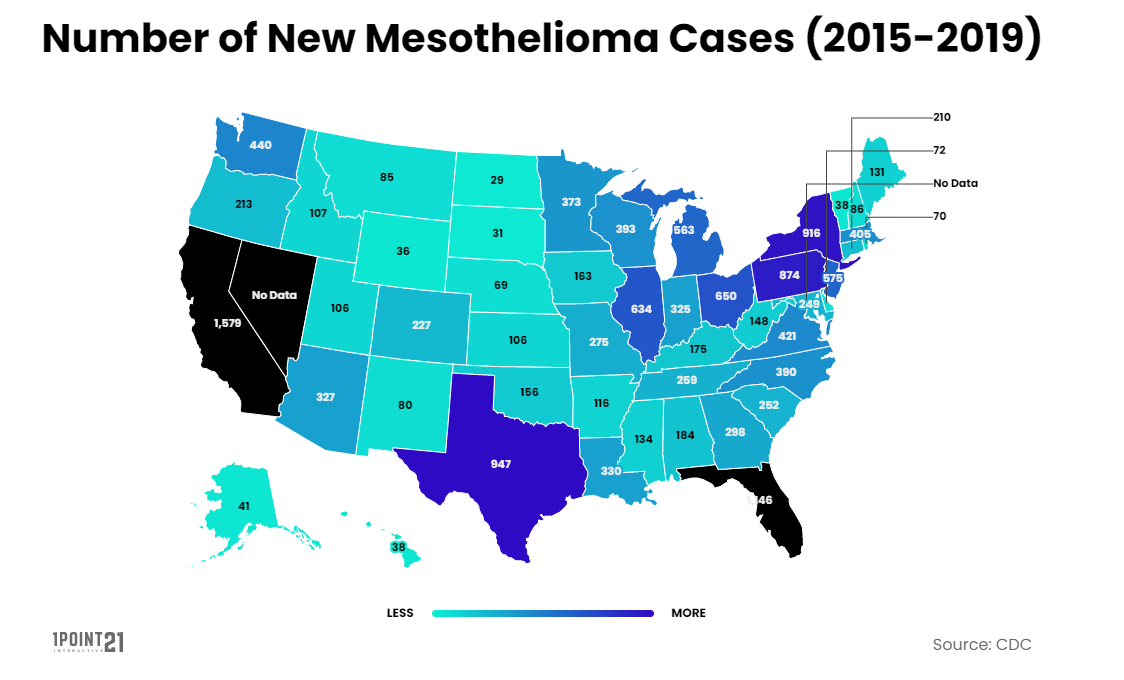Ever since asbestos was banned in 1989, it hasn’t been produced or utilized as much. But what about all of the products and places that already contain asbestos? Are the incidence rates of diseases caused by asbestos decreasing in the U.S.? Mesothelioma is the form of lung cancer caused by asbestos exposure, and it hasn’t disappeared just yet.
A recent data analysis by the Williams Law Firm, P.C. examined mesothelioma cases within the United States, as well as New York specifically. Below is a summary of the data.
Quick Stats
- From 2015 to 2019, there were 15,485 new cases of mesothelioma reported in the U.S.
- In 2020, over 120,000 people in the U.S. died from lung cancer (which includes mesothelioma). This is more deaths than any other type of cancer.
- Of the 4 types of mesothelioma, the most prevalent type is Pleural, accounting for about 70-79% of cases.
- Testicular mesothelioma is the rarest form, making up less than 1% of cases.
- The most common form of treatment for mesothelioma is chemotherapy, with around 80% of patients seeking chemo.
- After being diagnosed with mesothelioma, patients survive on average for another 12 to 31 months.
Despite being one of the most fatal forms of cancer, mesothelioma is actually one of the least prevalent types.
Map: New Mesothelioma Cases by State
Below is a map displaying the number of reported mesothelioma cases in the United States over a four year period.
Demographics of Mesothelioma Cases
Wondering who is at risk for mesothelioma? It’s not just anyone. Mesothelioma affects some people more than others, based on a number of factors.
- Occupation: Occupation is one of the most important contributing factors to contracting mesothelioma. Some jobs involve asbestos exposure more than others, and its these repeated exposures overtime that cause the disease to form. Some of the workplaces that with high risk of asbestos exposure are: auto and aircraft mechanics, carpenters, construction workers, navy seaman and shipyard workers, HVAC workers, and oil rig or power plant workers. In addition to developing mesothelioma from small amounts of repeated asbestos exposure, it’s also possible to develop it from a few instances of high exposure, such as the firefighters who cleaned up the aftermath of 9/11.
- Age: The average age for a mesothelioma diagnosis is 71 for women, and 71 for men. This is due to the latency period of mesothelioma; it can take anywhere from 10 to 50 years after asbestos exposure for patients to start exhibiting symptoms.
- Sex: Men are 4.6 times more likely than women to be diagnosed with mesothelioma.
- Race: The majority of mesothelioma patients (95%) are White. Hispanic populations have some mesothelioma cases as well, but Asian and Black communities are rarely affected.
- Location: When it comes to mesothelioma deaths, rates are highest in the Northern United States (which includes the Northeast, Midwest, and Northwest).
For comparison with other cancers, below is a table breaking down new cancer cases in New York in 2019:
New Cancer Cases (New York, 2019)
| TYPE OF CANCER | CASE COUNT |
|---|---|
| Brain and Other Nervous System | 1,365 |
| Cervix | 812 |
| Colon and Rectum | 8,918 |
| Corpus and Uterus, NOS | 4,204 |
| Esophagus | 1,124 |
| Female Breast | 17,730 |
| Hodgkin Lymphoma | 654 |
| Kaposi Sarcoma | 122 |
| Kidney and Renal Pelvis | 4,241 |
| Larynx | 721 |
| Leukemias | 3,548 |
| Liver and Intrahepatic Bile Duct | 2,159 |
| Lung and Bronchus | 14,156 |
| Melanomas of the Skin | 4,444 |
| Mesothelioma | 160 |
| Myeloma | 2,010 |
| Non-Hodgkin Lymphoma | 5,097 |
| Oral Cavity and Pharynx | 2,872 |
| Ovary | 1,399 |
| Pancreas | 3,677 |
| Prostate | 16,730 |
| Stomach | 2,046 |
| Testis | 568 |
| Thyroid | 4,089 |
| Urinary Bladder | 5,449 |
As you can see from the New York sample, mesothelioma is not as prevalent as other types of cancer. But some people, such as those in the occupations listed above, are still being exposed to asbestos on a daily basis. Because mesothelioma is such a fatal disease (the five-year survival rate is 10%), it’s important that people are aware of when and where they could be exposing themselves to asbestos. It is the responsibility of employers to ensure that their workers are safe. If you or a loved one has developed mesothelioma, or you are at high risk, contact a mesothelioma attorney to discuss your options.






No Comment